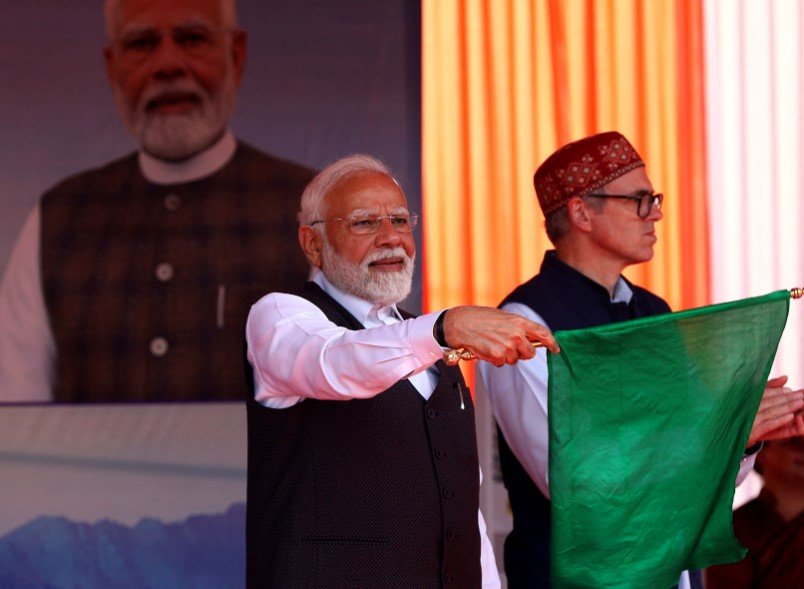India’s PM visits divided Nicosia, affirms Cyprus sovereignty, receives top state honour — signaling a rare rebuke to Ankara
Prime Minister Narendra Modi made a bold diplomatic statement during his brief visit to Cyprus, stopping over en route to Canada for the G7 Summit. In a move that subtly but unmistakably distanced New Delhi from Ankara, Modi reaffirmed India’s support for the sovereignty and territorial integrity of Cyprus — a country with which Turkiye has had an unresolved dispute for decades.
And that wasn’t just lip service. Standing near the UN-controlled Green Line, with the symbolic flag of the Turkish-occupied north in the background, Modi stood shoulder to shoulder with Cyprus President Nikos Christodoulides. The message? Loud and clear.
Delhi Turns Up the Volume on Cyprus Support
This is no everyday diplomatic nicety. Modi’s stopover in Cyprus — the first by an Indian PM in years — was laced with symbolic weight. He didn’t just endorse Cyprus’ unity in passing; he brought it up front and center.
In his remarks, Modi said India “strongly supports the independence, sovereignty, territorial integrity and unity of the Republic of Cyprus.” And he chose to say this from Nicosia, standing mere meters from the militarized divide that still splits the country.
Even more pointed, perhaps, was the timing. This support came just days after Turkiye backed Pakistan — again — in the longstanding India-Pakistan conflict. The optics weren’t lost on anyone watching closely.

Grand Honour, Subtle Messaging
The Cypriot government didn’t miss a beat. In a clear gesture of friendship, President Christodoulides awarded PM Modi the Grand Cross of the Order of Makarios III — Cyprus’ highest civilian honour for foreign leaders.
This is a big deal diplomatically. Few leaders outside Europe have received the honour. The order is named after Cyprus’ first president and national icon, Archbishop Makarios III.
It was a symbolic embrace from Nicosia — and it was reciprocated. Modi didn’t mince words. “President Christodoulides and I expressed concern over the ongoing conflicts in West Asia and Europe,” Modi said. “We agree: this is not an era of war.”
The Turkiye-Pakistan Factor
So, what’s really going on here? Analysts see India’s show of support for Cyprus as a soft-power rebuke to Turkiye’s alignment with Pakistan. Turkiye has repeatedly championed Islamabad’s claims over Kashmir in international forums, irking India.
This recent flare-up came during a summit in Istanbul, where Turkish President Recep Tayyip Erdoğan echoed Pakistan’s narrative once again. That pushed India closer to countries that have historical frictions with Ankara — Cyprus being a prime example.
In fact, the joint Modi-Christodoulides statement explicitly mentioned resuming UN-backed talks to resolve the Cyprus issue — something Ankara has long resisted.
Growing Economic Ties Also on the Agenda
But this wasn’t all about geopolitics. The visit also saw some practical outcomes, particularly in economic cooperation. Cyprus may be small, but it’s a member of the EU — and India sees potential in fintech, shipping, and connectivity.
A key focus was the India-Middle East-Europe Economic Corridor (IMEC), a mega connectivity initiative that aims to challenge China’s Belt and Road. Cyprus, located at the eastern edge of the Mediterranean, fits neatly into that vision.
Here’s a snapshot of some sectors discussed during the bilateral talks:
-
Trade and Investment
-
Fintech & Digital Payments
-
Maritime & Shipping Cooperation
-
Defence and Security Ties
-
Support for the IMEC corridor
Cyprus Issue: A Historical Pain Point
The “Cyprus Question” isn’t new — it dates back to 1974, when Turkiye invaded the northern part of the island following a coup backed by Greece. The island has remained divided since.
The Turkish Republic of Northern Cyprus (TRNC), proclaimed in 1983, is only recognized by Turkiye. The rest of the world considers it illegal occupation.
Here’s how the current situation breaks down:
| Territory | Status | International Recognition |
|---|---|---|
| Republic of Cyprus | EU Member, internationally recognized | All UN member states except Turkiye |
| Turkish Republic of Northern Cyprus | Declared in 1983, under Turkish military control | Recognized only by Turkiye |
Modi’s visit to the buffer zone separating these two parts was a first for an Indian leader. The choice to go there, pose for pictures, and hold talks with Christodoulides was seen as an explicit gesture of solidarity.
Broader Context of Modi’s G7 Route
This wasn’t just a stopover for photo ops. The Cyprus leg of Modi’s G7 journey served a multi-layered purpose. On one level, it reaffirmed ties with a European partner. On another, it signaled to Turkiye that India isn’t backing down on its global positioning.
It also gave India the chance to remind Europe of its non-aligned, multi-aligned identity. As war drums beat louder in both Ukraine and Gaza, Modi’s “not an era of war” statement is part of a broader diplomatic theme — one he’s used from Moscow to Paris.
One sentence stood out more than most. Modi said, “India supports efforts to achieve a comprehensive and lasting settlement of the Cyprus problem in accordance with UN Security Council resolutions.” That wasn’t offhanded — it was deliberate.
What This Means for India’s Diplomatic Posture
India has usually played it safe on issues far from home. But things are changing. Whether it’s raising its voice on Ukraine or now backing Cyprus publicly, Delhi’s foreign policy is growing bolder.
Will it risk ties with Turkiye? Possibly. But the calculation is that Ankara’s ties with Islamabad make that risk acceptable. Plus, India is betting on deeper European engagement — politically and economically.
